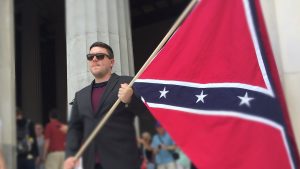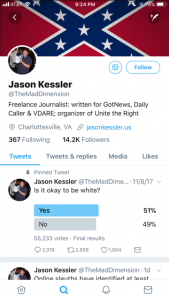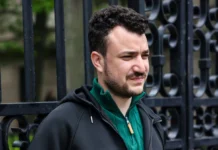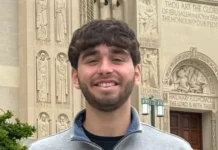
Earlier this week, Twitter announced that they were shutting down their popular verification system for some profiles. This feature places a blue check mark next to a username that is typically significant or of public interest. Jason Kessler, the notorious white supremacist and organizer of the Charlottesville “Unite the Right” rally in August, was initially awarded one of these blue checks.
There was no explicit reason for the recognition, other than the fact that Twitter may have done this because Kessler draws a moderate amount of online traffic to his account. Twitter does not verify people to endorse them necessarily, however the tool does recognize such users as important. A verified user for example, comes up more in Internet searches.
Kessler reacted to the verification via Twitter: “Looks like I FINALLY got verified by Twitter, I must be the only working class white advocate with that distinction.”

After receiving user backlash from this decision to verify Kessler, Twitter made a statement about how they would reevaluate their program: “Verification was meant to authenticate identity & voice but it is interpreted as an endorsement or an indicator of importance. We recognize that we have created this confusion and need to resolve it. We have paused all general verifications while we work and will report back soon.”
Since then, Twitter has been focused on removing the presence of hate groups and racism on their network.
After Kessler wreaked havoc on UVa grounds and Charlottesville city, WUVA wanted to know how UVa students reacted to the Twitter ordeal.
Taylor McDonald thought that: “Though employees were simply following protocol, Twitter’s verification of Jason Kessler both sparks understandable outrage of the acknowledgement of a white supremacist as a prominent public figure and illuminates the flaws in the verification program.
“Though the CEO, Jack Dorsey, publicly denounces the hate that is promoted by Neo-Nazi groups like Unite the Right, messages of hate are strewn across twitter which brings up the issue of censorship and what we are allowed to address on a public platform,” McDonald said.
Keara Meyerson agreed. “Clearly Twitter needs a more specific guideline of who gets verified and why, because the connotation now with verification is that the person is important and popular. Clearly, this man is neither.”

A UVA First-Year had a slightly different opinion. “Although I do think that Twitter needs to fix its system of verifying users (specifically regarding high profile users who do not end up getting verified), I believe the outrage over someone with abhorrent views getting verified is an extremely trivial thing to get angry over.”
“The point of verifying users is to authenticate them, not to endorse them–by refusing to authenticate someone who is unique and at least recognizable in his/her commentary group, you are not protecting free speech. You are intentionally filtering opinions you do not want to hear,” the student continued.
Ryan Finley thought the verification process should not be revised. “I definitely see people’s point of view and why they’re mad. He definitely doesn’t deserve to be verified and I think it makes Twitter look like they are supporting people like him. I would say I don’t fully understand the verification process but that he shouldn’t have been verified because the things he does are not right.”
“Although everyone has the right to free speech, Twitter should not show any type support for the type of things he is saying,” Finley noted.
Kessler himself on the other hand, claimed that: “I don’t engage in harassment. I simply stand up for white rights and criticize mass immigration policies.”
The white nationalist also argued that Twitter is supposed to warn users and ask them to “delete an offending tweet.” His Twitter account nonetheless is no longer verified.
















